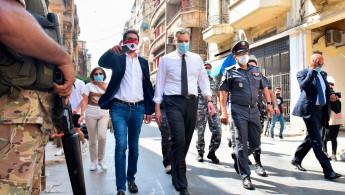Lebanon PM designate pledges to form crisis cabinet within two weeks
Government formation is usually a drawn-out process in multi-confessional Lebanon where a complex political system seeks to share power between different religious groups.
But a traumatic explosion at Beirut port last month has created intense pressure for swift reforms to lift the country out of its worst economic crisis in decades.
The last government, only in power since the start of the year, resigned in the wake of the 4 August explosion that killed at least 188, wounded thousands and laid waste to entire districts of the capital.
Read also: Desires for Eastern Mediterranean clout drive offers to rebuild Beirut's port
With the clock ticking, prime minister designate Mustapha Adib was to meet the parliament speaker, former prime ministers and parliamentary bloc representatives.
Lebanon lawmakers rushed to approve the nomination of the little-known 48-year-old diplomat Monday on the eve of a high-profile visit by French President Emmanuel Macron.
Twitter Post
|
Visiting to mark the centenary of the former French protectorate, Macron said on Tuesday that all sides had pledged to help Adib form a cabinet within two weeks.
He promised to host two conferences in Paris in the second half of October - one to help drum up aid and the other to discuss political reform.
He said he would be back in Lebanon in December for a progress report.
US Assistant Secretary of State for Near Eastern Affairs, David Schenker, was due in Lebanon Wednesday to "urge Lebanese leaders to implement reforms that respond to the Lebanese people's desire for transparency, accountability, and a government free of corruption", the embassy said.
A protest movement, which has taken to the streets since last October demanding the ouster of the political elite, has already rejected Adib's nomination.
Hundreds protested on Tuesday evening demanding a secular state to replace the decades-old sectarian system, with clashes erupting in the evening between some demonstrators and security forces.
Lebanon's worst economic crunch since the 1975-1990 civil war has seen poverty rates double to more than half the population, sent prices soaring and trapped people's savings in the banks.
Follow us on Facebook, Twitter and Instagram to stay connected





 Follow the Middle East's top stories in English at The New Arab on Google News
Follow the Middle East's top stories in English at The New Arab on Google News
![The UAE is widely suspected of arming the RSF militia [Getty]](/sites/default/files/styles/image_330x185/public/2024-11/GettyImages-472529908.jpg?h=69f2b9d0&itok=Yauw3YTG)
![Netanyahu furiously denounced the ICC [Getty]](/sites/default/files/styles/image_330x185/public/2024-11/GettyImages-2169352575.jpg?h=199d8c1f&itok=-vRiruf5)
![Both Hamas and the Palestinian Authority welcomed the ICC arrest warrants [Getty]](/sites/default/files/styles/image_330x185/public/2024-11/GettyImages-2178351173.jpg?h=199d8c1f&itok=TV858iVg)